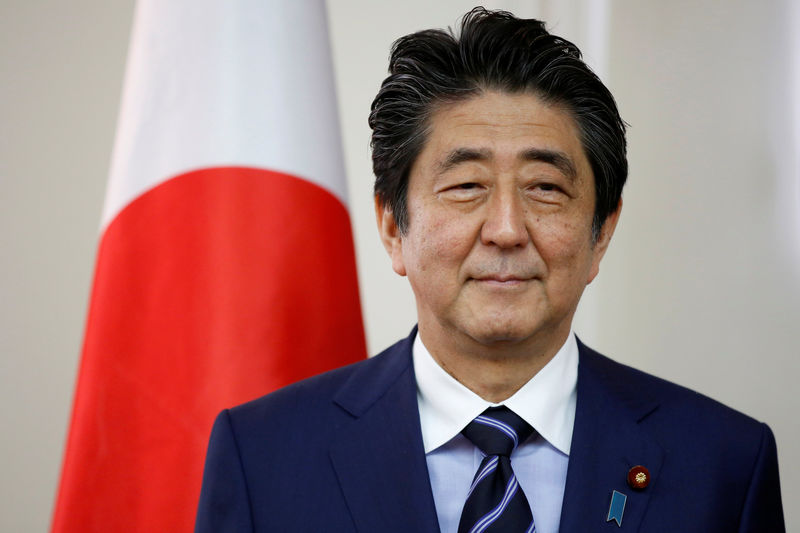 © Reuters. FILE PHOTO: Japan’s Prime Minister Shinzo Abe is seen during a meeting with Israeli Prime Minister Benjamin Netanyahu and Japanese businessmen, at the Prime Minister’s office in Jerusalem
© Reuters. FILE PHOTO: Japan’s Prime Minister Shinzo Abe is seen during a meeting with Israeli Prime Minister Benjamin Netanyahu and Japanese businessmen, at the Prime Minister’s office in JerusalemBy Stanley White and Leika Kihara
TOKYO (Reuters) – The Bank of Japan on Monday won approval from influential members of the government’s leading advisory panel for its decision to abandon the timeframe it had set for meeting its inflation target.
Prime Minister Shinzo Abe also expressed confidence in the BOJ, signaling the central bank can proceed unimpeded with a dramatic shift in policy it unveiled last month.
In its quarterly outlook report, the BOJ ditched its forecast for when inflation will reach 2 percent, saying this will dispel the notion that the central bank is obliged to ease policy if it pushes back this forecast.
“We discussed monetary policy and the economic conditions,” Abe said at the end of Monday’s meeting of the Council on Economic and Fiscal Policy (CEFP).
“Private-sector members of the panel said the BOJ is conducting monetary policy appropriately,” he said. “I expect the BOJ to continue to take steps to meet price stability.”
The private-sector members are four academics whose recommendations regularly influence policy because they are considered to be close to the prime minister.
Abe also said the government and the BOJ have reaffirmed their resolve to stick to a joint statement they signed in 2013, under which they agreed to take necessary policy steps to beat deflation.
Under the joint statement, the BOJ agreed to do its utmost to achieve its inflation target at the earliest date possible, while the government pledged to restore long-term fiscal health.
By eliminating its forecast for when it expects inflation to reach the 2 percent price target, the BOJ has effectively made the price target a medium-term goal, some economists say.
BOJ Governor Haruhiko Kuroda said last month this will improve communication and bring it in line with other major central banks.
The U.S. Federal Reserve and the European Central Bank do not issue forecasts for when they expect to reach their price targets.
A government official told reporters on Monday that Abe’s administration is supportive of the BOJ’s decision to follow other central banks by not forecasting when it will meet its price target.
The BOJ has pushed back the target timeframe six times due to Japan’s subdued inflation rate. Analysts have criticized the central banks for being too optimistic in its forecasts.
Fusion Media or anyone involved with Fusion Media will not accept any liability for loss or damage as a result of reliance on the information including data, quotes, charts and buy/sell signals contained within this website. Please be fully informed regarding the risks and costs associated with trading the financial markets, it is one of the riskiest investment forms possible.
Source: Investing.com

























